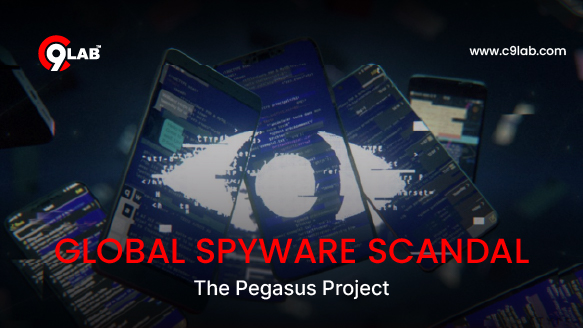Abstract
This case study examines Pegasus, a sophisticated spyware created by the Israeli company NSO Group. The Pegasus Project investigation exposed its widespread use for surveillance of journalists, activists, opposition politicians, and even heads of state. This document provides a publication-ready account of the incident, covering the spyware’s capabilities, confirmed infections, the resulting legal and political fallout, and the broader implications for democracy, privacy, and cybersecurity.
Executive summary
Pegasus is a zero-click spyware capable of compromising smartphones without user interaction. Once installed, it provides full access to calls, messages, photos, emails, microphones, and cameras. The 2021 Pegasus Project investigation revealed tens of thousands of phone numbers as potential targets, including high-profile figures worldwide. The scandal triggered lawsuits against NSO Group, global debates on surveillance abuse, and calls for stronger international regulation.
Scope and ethical constraints
This case study is based on public, non-classified information from Amnesty International, Citizen Lab, and media reports. No instructions for wrongdoing are provided, and no personally identifiable information (PII) is included. The study focuses on legal, ethical analysis of spyware abuse and its implications for civil liberties.
Background (why this matters)
Pegasus represents a watershed moment in cybersecurity and human rights. It highlighted how advanced surveillance technology, marketed for counterterrorism, was allegedly misused against journalists, activists, and politicians. The revelations spurred global lawsuits, diplomatic tensions, and renewed debate on digital rights.
Incident summary
Date of revelation: 2021 (Pegasus Project leak and investigation)
Impacted targets: Journalists, opposition leaders, activists, business figures, heads of state across multiple countries
Initial finding: Amnesty and Citizen Lab forensic analysis confirmed Pegasus infections on multiple devices.
Immediate impact: Governments worldwide faced scrutiny; lawsuits and global condemnation followed.
Methodology — Investigation & analysis (reproducible steps)
The Pegasus Project followed four key phases:
Evidence collection and forensic analysis of infected devices.
Cross-referencing leaked target lists with confirmed infections.
Public reporting through major media outlets to ensure global awareness.
Legal, political, and advocacy follow-ups including lawsuits and UN statements.
Timeline (key events)
| UTC Timestamp | Local Timestamp | Event | Source/Evidence |
| 2021-07-18 | 2021-07-18 | Pegasus Project report released, revealing widespread targeting | Amnesty International & Citizen Lab forensic reports |
| 2021-10 | 2021-10 | WhatsApp lawsuit against NSO progresses in U.S. courts | Court filings |
| 2021-11 | 2021-11 | Apple sues NSO, seeking accountability and prevention of iOS exploitation | Apple legal filings |
| 2022-2023 | 2022-2023 | Forensic reports confirm reinfections on journalists’ devices; UN raises alarms | Amnesty/Citizen Lab updates; UN statements |
Findings
Pegasus exploits zero-click vulnerabilities, bypassing even secure platforms like iOS and WhatsApp.
Surveillance extended beyond criminals or terrorists, affecting journalists, activists, and political leaders.
NSO Group faced lawsuits from WhatsApp and Apple, as well as mounting global pressure.
Analysis & interpretation
The Pegasus scandal underscored the dangers of commercial spyware in the absence of global regulation. While marketed for legitimate counterterrorism purposes, Pegasus was allegedly used against civil society, undermining trust in governments and technology vendors.
Remediation steps taken (summary)
Lawsuits initiated by WhatsApp and Apple to hold NSO accountable.
UN and international watchdogs called for bans and stronger controls on spyware sales.
Public awareness campaigns raised global attention on surveillance abuse.
Legal & ethical considerations
The Pegasus case raised serious legal and ethical issues around surveillance. Governments and companies faced scrutiny over misuse. The study emphasizes accountability, oversight, and the protection of press freedom.
Recommendations (for practitioners & policymakers)
Establish strict international regulations for spyware vendors and exports.
Enforce government accountability and transparency in surveillance use.
Promote device security research and patching to reduce zero-click exploit risks.
Recognize digital rights as core human rights requiring protection.
Conclusion
The Pegasus Project stands as a landmark case study in cybersecurity and human rights. It demonstrates the risks posed by unchecked spyware technology and highlights the urgent need for stronger safeguards, legal frameworks, and respect for privacy and democracy in the digital age.
Appendices
Appendix A — Timeline snapshots and forensic findings (summarized)
Appendix B — Key lawsuits: WhatsApp v. NSO, Apple v. NSO
Appendix C — UN statements on spyware abuse and recommendations
Shape
This document is released under a permissive CC BY-style attribution for educational and defensive purposes. Use responsibly.

